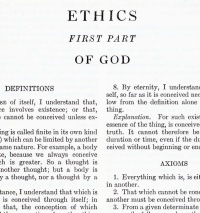Baruch Spinoza
From The Art and Popular Culture Encyclopedia
|
"One way to read Spinoza's Ethics and make sense of it is to note that in two places Spinoza wrote "God or Nature" (Deus sive Natura). This equivalence can be found in Part IV, Preface and in Part IV, Proposition IV, Proof. If you read "Nature" every time you see the word "God," then the whole book is understandable. When Einstein said that he worshiped Spinoza's God, he meant that he found happiness when he studied nature."--(User:Lestrade) 16:19, 6 June 2008 (UTC)[1] "I have labored carefully not to mock, lament, or execrate the actions of men; I have labored to understand them.”--Tractatus Politicus |

|
Related e |
|
Featured: |
Benedictus de Spinoza or Baruch de Spinoza (lived November 24, 1632 – February 21, 1677) was a Dutch philosopher of Portuguese Jewish origin. Revealing considerable scientific aptitude, the breadth and importance of Spinoza's work was not fully realized until years after his death. Today, he is considered one of the great rationalists of 17th-century philosophy, laying the groundwork for the 18th century Enlightenment and modern biblical criticism. By virtue of his magnum opus, the posthumous Ethics, he is also considered one of Western philosophy's definitive ethicists.
Spinoza lived a quiet life as a lens grinder, turning down rewards and honours throughout his life, including prestigious teaching positions, and gave his family inheritance to his sister. Spinoza's moral character and philosophical accomplishments prompted twentieth-century philosopher Gilles Deleuze to name him "The absolute philosopher" (Deleuze, 1990). Spinoza died in February 1677 of consumption, likely compounded by fine glass dust inhaled while tending to his trade. Variations to his surname are abundant: Despinoza, d'Espinoza, de Spinoza, Spinoza, et cetera.
Modern relevance
Late 20th-century Europe demonstrated a greater philosophical interest in Spinoza, often from a left-wing or Marxist perspective. Notable philosophers Gilles Deleuze and Antonio Negri have each written books on Spinoza. Unlike most philosophers, Spinoza and his work were highly regarded by Nietzsche.
Philosopher Ludwig Wittgenstein evoked Spinoza with the title (suggested to him by G. E. Moore) of the English translation of his first definitive philosophical work, Tractatus Logico-Philosophicus, an allusion to Spinoza's Tractatus Theologico-Politicus. Elsewhere, Wittgenstein deliberately borrowed the expression sub specie aeternitatis from Spinoza (Notebooks, 1914-16, p. 83). The structure of his Tractatus Logico-Philosophicus does have certain structural affinities with Spinoza's Ethics (though, admittedly, not with the latter's own Tractatus), in erecting complex philosophical arguments starting from basic logical assertions and principles. Furthermore, in propositions 6.4311 and 6.45 he alludes to a Spinozian understanding of eternity and interpretation of the religious concept of eternal life: stating that "If by eternity is understood not eternal temporal duration, but timelessness, then he lives eternally who lives in the present." (6.4311) "The contemplation of the world sub specie aeterni is its contemplation as a limited whole." (6.45) Furthermore, Wittgenstein's interpretation of religious language, in both his early and later career, may be said to bear a family resemblance to Spinoza's pantheism.
Spinoza has had influence beyond the confines of philosophy. The nineteenth century novelist, George Eliot, produced her own translation of the Ethics, the first known English translation thereof. The twentieth century novelist, W. Somerset Maugham, alluded to one of Spinoza's central concepts with the title of his novel, Of Human Bondage. Albert Einstein named Spinoza as the philosopher who exerted the most influence on his world view (Weltanschauung). Spinoza equated God (infinite substance) with Nature, consistent with Einstein's belief in an impersonal deity. In 1929, Einstein was asked in a telegram by Rabbi Herbert S. Goldstein whether he believed in God. Einstein responded by telegram "I believe in Spinoza's God who reveals himself in the orderly harmony of what exists, not in a God who concerns himself with the fates and actions of human beings." Spinoza's pantheism has also influenced the environmental theory. Arne Næss, the father of the deep ecology movement, acknowledged Spinoza as an important inspiration. Moreover, Argentinian writer Jorge Luis Borges, was greatly influenced by Spinoza's world view. In many poems and short stories, he makes constant allusion to the philosopher's work, not as a partisan of his doctrines, but merely in order to use these for aesthetical purposes. He has done it many times with all the philosophers whose work he admired.
Spinoza is an important historical figure in the Netherlands, where his portrait was featured prominently on the Dutch 1000-guilder banknote, legal tender until the euro was introduced in 2002. The highest and most prestigious scientific award of the Netherlands is named the Spinoza prijs (Spinoza prize). Spinoza's work is also mentioned as the favourite reading material for Bertie Wooster's valet Jeeves in the P. G. Wodehouse novels
See also
- Amor est titillatio, concomitante idea causæ externæ
- Treatise of the Three Impostors
- Thomas Hirschhorn's monument dedicated to Baruch Spinoza (Amsterdam, 1999)
- Atheism in the Age of the Enlightenment

